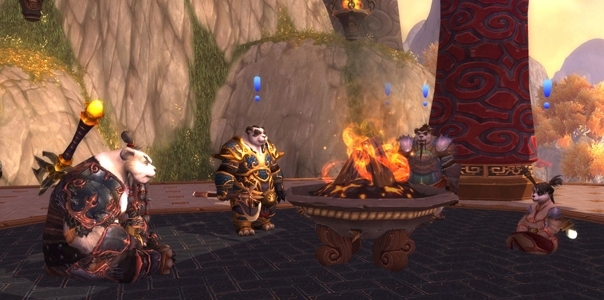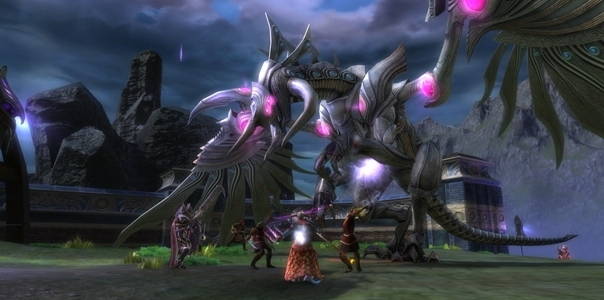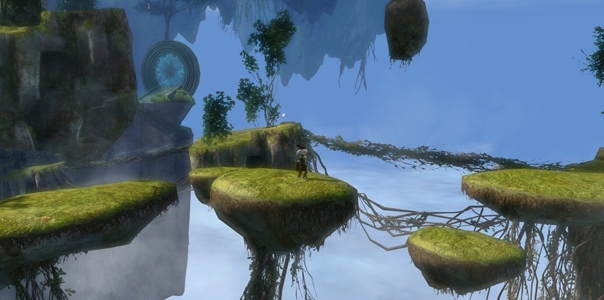Game Mechanics: Questing
In a new regular feature, Gareth Harmer digs into the most-abused mechanic afflicting modern MMOs.

Here at ZAM we like to dissect games, bolting them down to the operating table and pulling them apart to examine what makes them tick. It’s not enough to know that a particular MMO is good or bad. We want to understand why.
But to know the beast, you have to understand the anatomy of the beast, which is why we’ve launched this regular column. In Game Mechanics, we’ll be examining a component of MMO gaming, looking at how it works in detail and the purpose it serves within the overall game. We’ll share our gripes and loves about how it’s been used in a mixture of MMOs, asking if it’s become a mainstay of our beloved genre, or if it leads us to an evolutionary dead end.
With that in mind, it’s time to pull on our lab coats and don those rubber gloves. Goggles are optional.

Kicking off this week is one of the most loved and loathed mechanics of all time. If you’ve played any MMO, there’s a strong chance you’ll have run headfirst into this. It’s become so embedded in the MMO genre that tropes have spawned from it. I’m talking about being asked to Kill Ten Rats. I’m talking about escorting the dumb NPC through a forest of over-friendly poisonous spiders. I’m talking about being asked to pick up the book that’s right there, next to the NPC, and hand it to him.
Questing. Purveyor of some of the greatest experiences we’ve had in an MMO, yet responsible for some of the stupidest decisions known to gamerdom.
Games have been giving quests to players ever since Gary Gygax started guiding dungeoneers towards slaying their first dragon. Crowded around a table, dice-wielding gamers would be driven by a single overarching quest, with the tale of their adventure drawn from interplay between the Dungeon Master’s many scenarios and the heroes’ own choices.
It’s difficult to pinpoint exactly when this mechanic emerged with MMOs, but the trend was certainly present when EverQuest launched in 1999. Since then, questing has become even more visible, with the latest MMOs lighting up the interface with quest markers, trackers and more. But although that overarching arc is still there, the experience has been utterly fragmented.
We’re no longer on a heroic quest to kill the evil arch-nemesis. Instead, we’re playing from the self-help book on How to Slay Your Nemesis in Three Thousand Simple Steps. We’ve become the local handyman, fumigator and pest control, bounty hunter and missing persons finder. And most of the time, we’re doing it alone. I might see others running around like munchkins on a caffeine buzz, but my own experience of the game world is increasingly isolated.
Where in the blazes did it all go horribly wrong?

Questing for Fun and Profit
At its core, questing is used to get the player to perform some kind of task, broadly falling into one of four categories. There’s the archetypal kill quest, asking us to slay rats, swamp rats, wamprats, rat ogres, or any other creature that needs decimating. Gather quests used to have us collecting rare lily blossoms from unreachable mountaintops, but nowadays see us rummaging through junkyards or harvesting food from nearby fields. We’re also frequently asked to shrug off our heroic mantle and don a FedEx cap for fetch-carry quests, collecting a nearby object and delivering it to someone else.
Then there’s the worst of the bunch: the notorious escort quest. If you ever wanted an exercise in how to generate frustration, loathing and anger with one simple button-click, ask a player to escort an NPC through the wilderness. Chasing after Captain Oblivious as he wanders through a den of thieves, darting off at random when his magpie-like attention fixates on some innocuous feature, cursing loudly as his carefree attitude attracts the attention of every hostile creature within shouting distance. To cap it all, you’re the one they decide to attack, as if this AI-controlled buffoon is an affront to their sensibilities.
Wrapping all these together are breadcrumb quests, intended to shunt us from one collection of quests to the next. For an open-world game it can start to feel horribly on-rails. World of Warcraft: Cataclysm was one of the worst offenders here, with overused phasing serving to amplify that feeling of paying a subscription to play a massively single-player game. It was a shortcoming that Trion responded to with Rift: Storm Legion, moving kill and collection quests into the countryside. It was only partly successful – the ‘Carnage’ tagged creatures made a moving minefield that threatened to explode inside an overburdened quest log.
In order to persuade us that questing is something we want to do, completing a quest comes with a reward. Gold coins, new equipment (usually sold back to a vendor) and experience points are offered almost as bribes to get us to accept this style of gameplay. It’s push-button: receive bacon gameplay at its most overused. And after nearly fifteen years, it’s getting stale.

A Hero on a Legendary Journey
Picking out the bad examples of MMO questing is like using dynamite to fish from a barrel: incredibly easy, but you end up covered in gore. But not all questing is like this – the shared memory of the gaming hivemind is littered with examples of incredible journeys that our characters have had. The Great Masquerade is just one example, starting from humble beginnings and culminating with a band of heroes at the gates of Onyxia’s Lair.
Those moments, however, are few and far between. In order to make a typical game last longer than ten hours or so, dedicated quest teams cram in as much questing as possible, carefully calculating the amount of reward needed for characters to safely move from one zone to the next. It leads to repetition, with terrible plot points articulated by forgettable characters. There are ways of sugar-coating the experience, with BioWare hiring a team of writers and voice actors to bring Star Wars: The Old Republic to life. Most of the stories are great fun, but it also served to remind us of how good the Mass Effect and Dragon Age series are.
Besides carving up our journey from level zero to hero in bite size chunks, questing has begun to infect our experience at the top of the pile. At some point, someone thought that daily quests were a brilliant idea; taking the most repetitive mechanic in the game and forcing people through it every day, with the promise of Golden Magical Bacon in return for pushing the button thousands of times. In order to keep motivating players year after year, the rewards get bigger and better while the mechanism stays the same. This isn’t being a hero; it’s doing a job.
Having a continuous stream of quests running through the entire game also create a very solid temporal line. In order to get around the dampening effect this has on players questing together, chronological kludges like Sidekicking and Dynamic Level Adjustment emerged. Even so, returning to central cities can feel like venturing inside a Tardis.